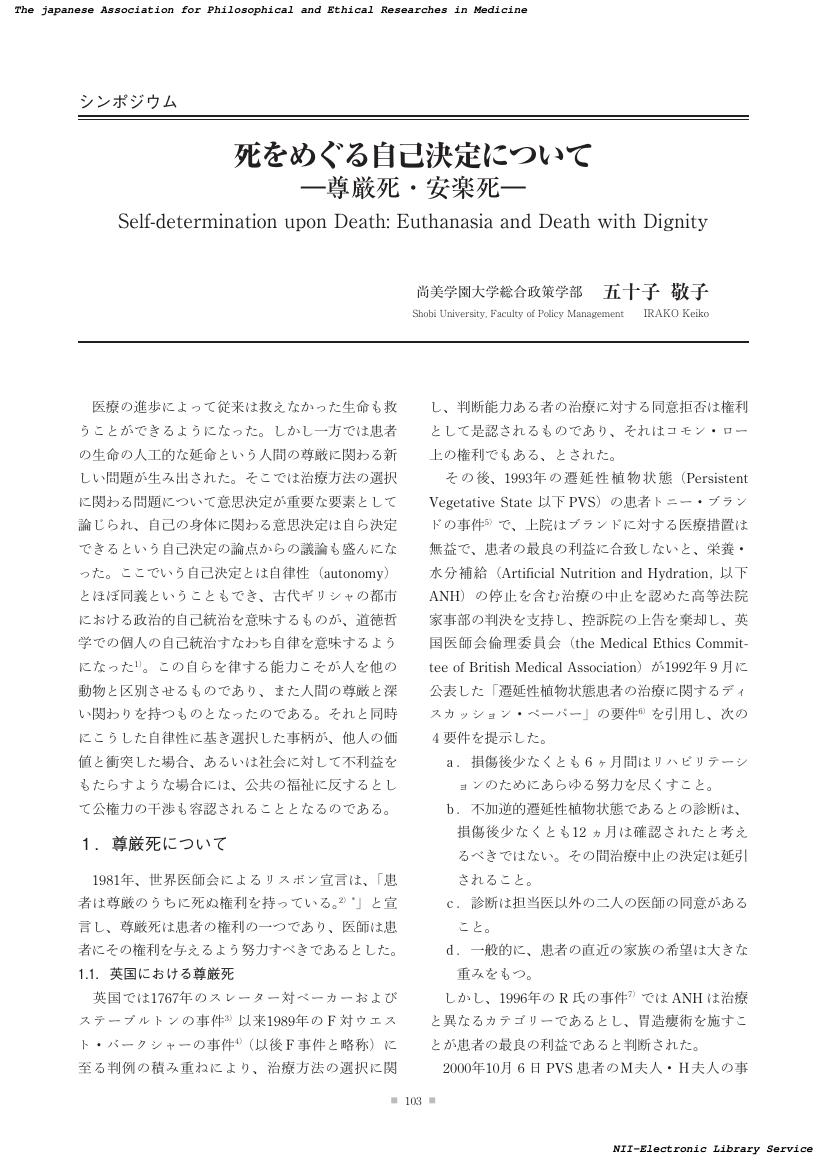1 0 0 0 OA 死をめぐる自己決定について : 尊厳死と安楽死と
- 著者
- 五十子 敬子
- 出版者
- 日本生命倫理学会
- 雑誌
- 生命倫理 (ISSN:13434063)
- 巻号頁・発行日
- vol.8, no.1, pp.94-99, 1998-09-07 (Released:2017-04-27)
- 参考文献数
- 40
19世紀後半に英国で、安楽死法に関する問題提起がなされた。日本でもすでに1882年(明治15年)に安楽死法の可否をめぐる議論が提起されている。本論文はそうした新資料の紹介を始めとして、死をめぐる自己決定について、各国の歴史的展開および現況を概観するものである。現代、安楽死論は、尊厳死論に移行する形で広くとりあげられるようになった。そこで本稿では、(1)尊厳死にかかわる問題(2)安楽死法の是非(3)今後の課題と提言に分け、(1)では現代医療が生み出した尊厳死への対応について外国と日本を比較する。(2)では外国の現状を紹介し、日本の判例、学説を検討し、安楽死法の是非を考察する。(3)では今後の日本における意思表示のあり方について提言することとする。
1 0 0 0 OA 意思決定の自由 : 死をめぐる自己決定について
- 著者
- 五十子 敬子
- 出版者
- 関西法政治学研究会
- 雑誌
- 憲法論叢 (ISSN:24330795)
- 巻号頁・発行日
- vol.17, pp.1-29, 2010-12-24 (Released:2018-01-10)
Freedom of decision-making means that people are free to make up their own minds and take responsibility for their decisions. The Preface to the Japanese Constitution stipulates "We, the Japanese people, acting through our duly elected representatives in the National Diet, determined that we shall secure for ourselves and our posterity the fruits of peaceful cooperation with all nations and the blessings of liberty throughout this land". In the third chapter, it defines freedom more precisely. In this paper, I will mainly discuss self-determination regarding death, starting with the definition of self-determination. The general definition of 'self-determination' is similar to 'autonomy', originally used to describe political self-government in ancient Greece. Subsequently, the term was used in moral philosophy to mean individual self-government. Although it is argued that the capacity for individual autonomous control is what distinguishes human beings from animals, at the same time, autonomous choices may conflict with other individual and social values. Secondly, I will discuss whether self-determination regarding therapy is a constitutional right, and how mentally incapacitated adults can take such decisions. I will compare Japanese, American and British judgments on these issues, and definitions of commission and omission. I would also like to suggest that Japan should move forward in reaching consensus on this.
1 0 0 0 OA 災害時及び被災後の医療システムの再構築
- 著者
- 五十子 敬子
- 出版者
- 関西法政治研究会
- 雑誌
- 法政治研究 (ISSN:21894124)
- 巻号頁・発行日
- vol.2, pp.31, 2016 (Released:2016-12-26)
1 0 0 0 OA 生命倫理 : その新たなる課題
- 著者
- 五十子 敬子
- 出版者
- 関西法政治研究会
- 雑誌
- 法政治研究 (ISSN:21894124)
- 巻号頁・発行日
- vol.First, pp.3-44, 2015-03-29 (Released:2017-07-06)
In the latter half of 20^<th> century, the medical science developed rapidly. Many diseases which were incurable before have become curable although legal amendments have been slow. But at the same time the development has brought us up several problems, for example, a question of life: when does human life begin and end?, how far can we use genetic engineering and assisted reproduction?, what way should human dignity be respected?, etc. In this paper, I inquire upon this problems in the following order, 1. Bioethics (the general) 2. Bioethics (the particular) 3. New problems In Japan, we don't have any regulations relating bioethics, such as human reproduction including genetic testing, making decisions on death with dignity. Law and regulations can outline the criteria for the theme. Legalization from impartial viewpoints is needed. I would like to introduce several promising approaches to settling those new problems of the bioethics for the future. Since the completion of genetic analysis, informed consent has increasingly been revealing its problems along with rapid technology advances. ・To support the vulnerable so that they can receive the advanced medical treatment when they need. ・To consider the best interests of the patient, child, and the weak. ・To consider individuality of the child in case of enhancement. ・To remember that humans are constituent members of nature.
- 著者
- 五十子 敬子
- 出版者
- 日本医学哲学・倫理学会
- 雑誌
- 医学哲学 医学倫理 (ISSN:02896427)
- 巻号頁・発行日
- vol.28, pp.103-108, 2010-09-24 (Released:2018-02-01)
1 0 0 0 英国における治療の中止と差し控えについて
- 著者
- 五十子 敬子
- 出版者
- 日本生命倫理学会
- 雑誌
- 生命倫理 (ISSN:13434063)
- 巻号頁・発行日
- vol.9, no.1, pp.127-133, 1999-09-13
1767年のSlater v.Stapletonの判決以来、判例の積み重ねにより、次の原則が確立した。*自己決定による健常者の治療の中止および差し控えは許容される。*無能力者に関しては医の慣行に照らし合わせ、かつ患者の最良の利益を考慮して決定される。英国では、死ぬ権利は認められないが、能力があり治療に対する同意がある場合の治療の中止、および差し控えの自己決定権は確立されている。その自己決定が結果として生命の終結を早めさせようとも、それは許容されている。一方、精神的無能力者の医療上の決定に関しては、現時点においても意見公募が続けられている。本論では、1.事例を通して形成された原則、2.司法および行政の見解、3.英国医師会の見解について考察し、治療の中止および差し控えの法制化についての検討を試みる。
- 著者
- 五十子 敬子 Keiko IRAKO 学校法人尚美学園総合政策学部
- 出版者
- 尚美学園大学総合政策学部
- 雑誌
- 尚美学園大学総合政策研究紀要 = Bulletin of policy and management, Shobi University (ISSN:13463802)
- 巻号頁・発行日
- vol.3, pp.9-28, 2002-11-30
オランダでは、2002年4月1日に、「要請による生命の終結および自殺幇助(審査手続き)法」が施行された。本法は国家の法としては世界初の安楽死法となるものである。オランダは自立して生活するための社会福祉も充実しており、弱者を切り捨てない平等主義が行き渡っている。その社会背景の中で、判例の積み重ねによって安楽死を許容するための基準が形成された。1993年には遺体埋葬法の一部が改正され、安楽死への厳格なガイドラインとなっていたが、本法はさらに刑法と遺体埋葬法を改正し、その要件を満たした安楽死を実施した医師を刑事訴追しないこととした。他方、1994年の英国の「医療の倫理特別委員会報告書」は、オランダの疼痛緩和医療が英国ほど進んでいないこと、また厳格な要件のもとであるにせよ安楽死許容の方向をとっていたことが、疼痛緩和医療を更に進めるための部分的障壁となっていることを指摘している。本論文はオランダの安楽死について疼痛緩和医療との関連のもとで考察するものである。On 1 April 2002, the following act came into force in the Netherlands: Review procedures for the termination of life on request and assisted suicide and amendment of the Criminal Code and the Burial and Cremation Act. This legislation allows patients experiencing unbearable suffering to request euthanasia, and the doctors who carry it out to be free from prosecution, provided they follow strict procedures. The legislation was passed in a society where individual independence and social welfare are well developed. However, the British Select Committee on Medical Ethics, which reported on the state of palliative care in Holland, together with some Dutch doctors, have expressed the view that palliative care is not as advanced in Holland as it is in Britain. One view is that legalization of euthanasia can become an obstacle to improving palliative care. Given this relationship between palliative care and euthanasia, it is impossible to consider one without looking at both. In this paper, I examine this relationship with reference to the effects of the new legislation in the Netherlands.

